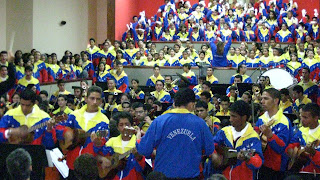Background. Early on in the Venezuelan orchestra movement, new centers all over the country started replicating the ideas and philosophy of José Antonio Abreu. However, larger decisions and funding management still happened in Caracas. In order to alleviate the amount of bureaucracy concentrated in Caracas, FESNOJIV encouraged the creation of State núcleos, each with their autonomous foundation. This facilitates many decisions to be taken locally and, most important, that each state núcleo can raise extra funds and grow faster without having to rely exclusively on Caracas (FESNOJIV still secures payment for all human resources).
Sunday, April 04, 2010
What is a núcleo? The Guárico State case.
Posted by/Publicado por
Alvaro F. Rodas
at/a las
8:03 PM
However, at the end there is also regional centralization when new programs in smaller towns need to rely on the decisions made in their state capital. Funding is still channeled through the state foundation. The state leadership also assigns human resources, so the few teachers available can only go visit the programs outside the capital every now and then. Under this organization, those new dependent centers were sometimes called módulos (modules). So, for instance, the town of ABC’s program would have been called the ABC Módulo of the Núcleo Estado XYZ.
Guárico State’s Structure in a nutshell. In recent years, Guárico State has been experiencing positive changes in leadership which has allowed innovation. The first thing to notice is that each town in Guárico has an autonomous núcleo (the town of Calabozo has two), which means that they have, or are moving towards having, its own foundation or other type of incorporation. The Guárico State Children and Youth Symphony Orchestra Foundation (FOSIJEG), led by conductor Jesús Morín (who is in his late 20s), is now the main institution that coordinates all Guárico State núcleos’ activities and oversees the state-wide human resources distribution, coordinates state-wide professional development programs, state-wide seminarios (camps), etc. They also oversee the creation of new programs across the state. Guárico also has one of the 3 extensions of the Caracas’ Simón Bolivar Conservatory that have been established so far.
Núcleos in Guárico. Up to the spring of 2010, Guárico State has 10 núcleos (3 of them in the process of acquiring legal incorporation as foundations, so for the time being they depend solely on FOSIJEG). Each núcleo’s human resources are paid by FESNOJIV, and some funds are raised for all núcleos by FOSIJEG, and some funds are raised locally by each núcleo. Therefore, the role of FOSIJEG in relation to the núcleos is reduced to making sure that each núcleos’ resources are used to their best by avoiding overlaps in programming and human resources.
During our visit to Guárico State, I had the chance to attend a meeting with all the state’s núcleo directors to decide on the instruments (types, brands, quantities, etc.) to buy on the next big purchase from a grant coordinated by Morín’s team. His leadership style during that meeting is a reflection of the progressive organization that makes Guárico stand out as a model for other states to follow.
Módulos in Guárico. In Guárico, the notion of the núcleo extension was not ruled out at all. Núcleos can still create módulos in nearby (sometimes not so close) neighborhoods or villages. They usually target communities in need, or simply communities that have expressed their interest and commitment in having a music program. Núcleos go out of their ways to provide human resources and create ad hoc programs with any resources available to create this new módulos, as long as the community offers commitment and encourages their children to participate.
There are 23 módulos in Guárico (1-6 módulos in the núcleos that have them). A teacher in the town of Calabozo told me that for them, the módulos are a way to be closer to the community. She thinks that FESNOJIV sees this also as a way to recruit and engage more children into joining the orchestras and choirs. Regularly, the idea was to make use of the schools buildings (or other venues) on after-school schedules. However, in some cases, the schools were eager to incorporate the módulo music program into the school’s schedule.
More to come on the Guárico State módulos.
Subscribe to:
Comments (Atom)
.jpg)




